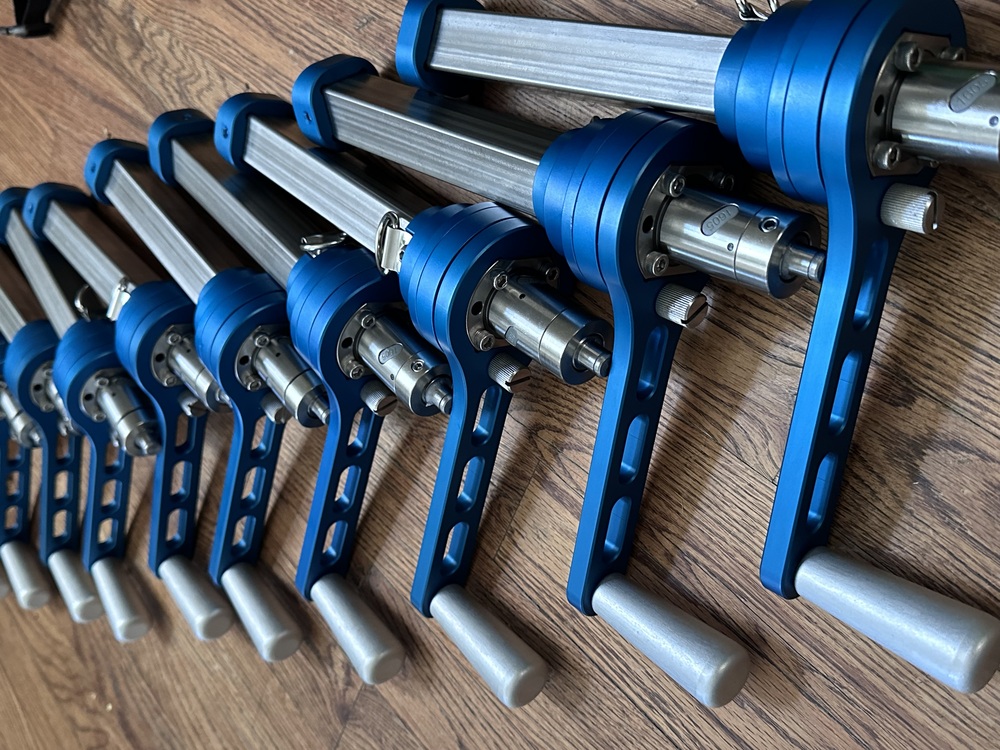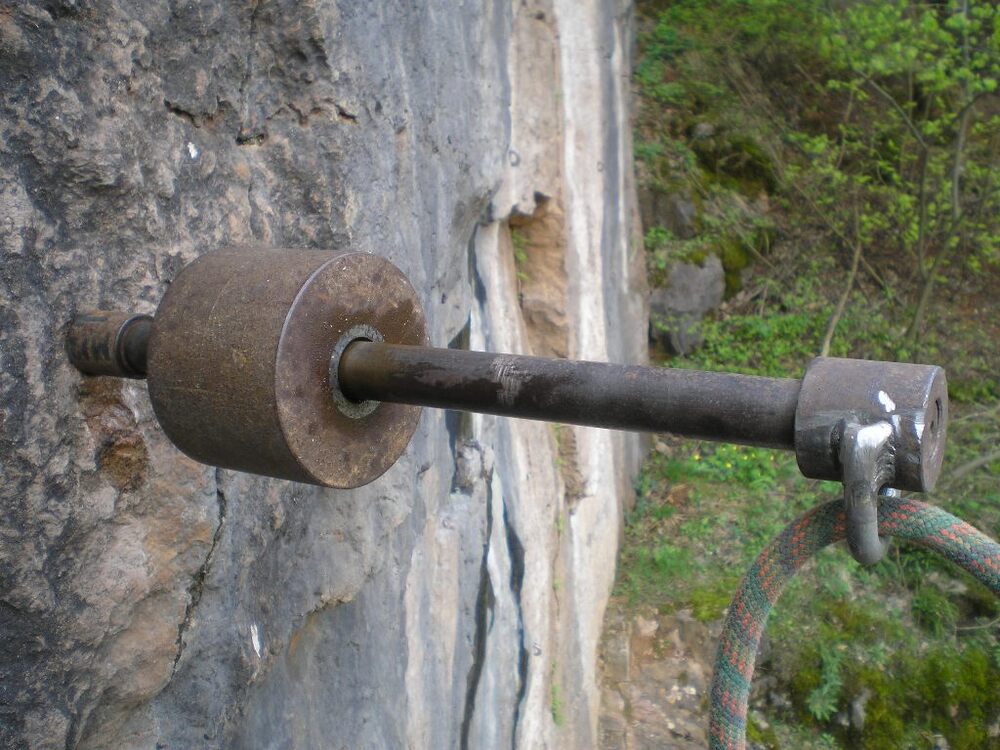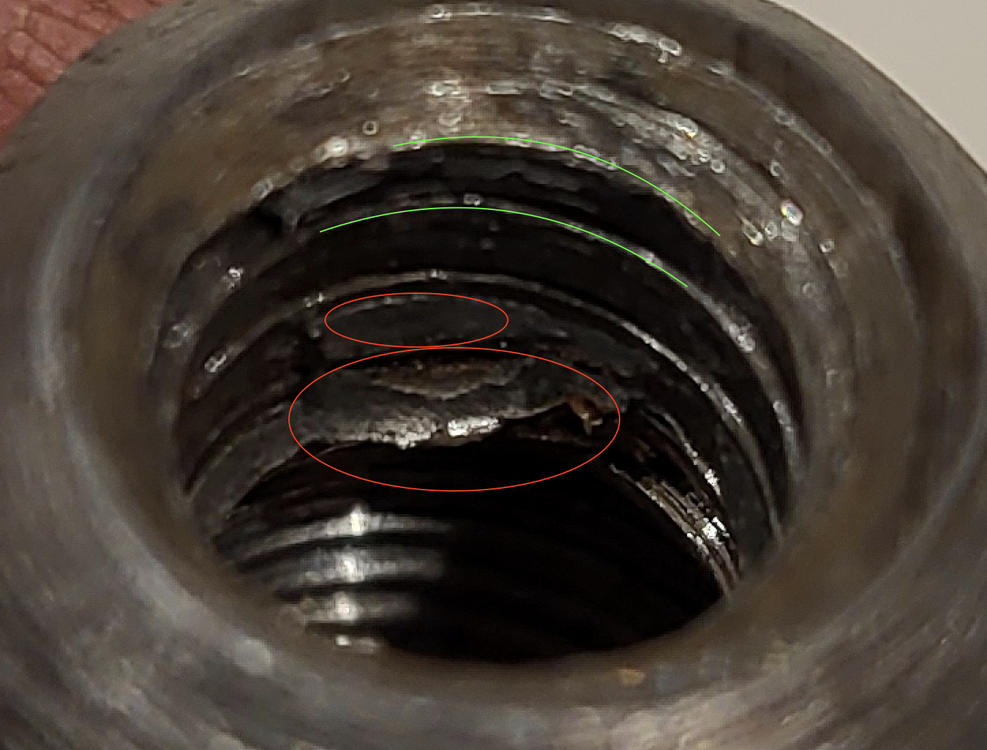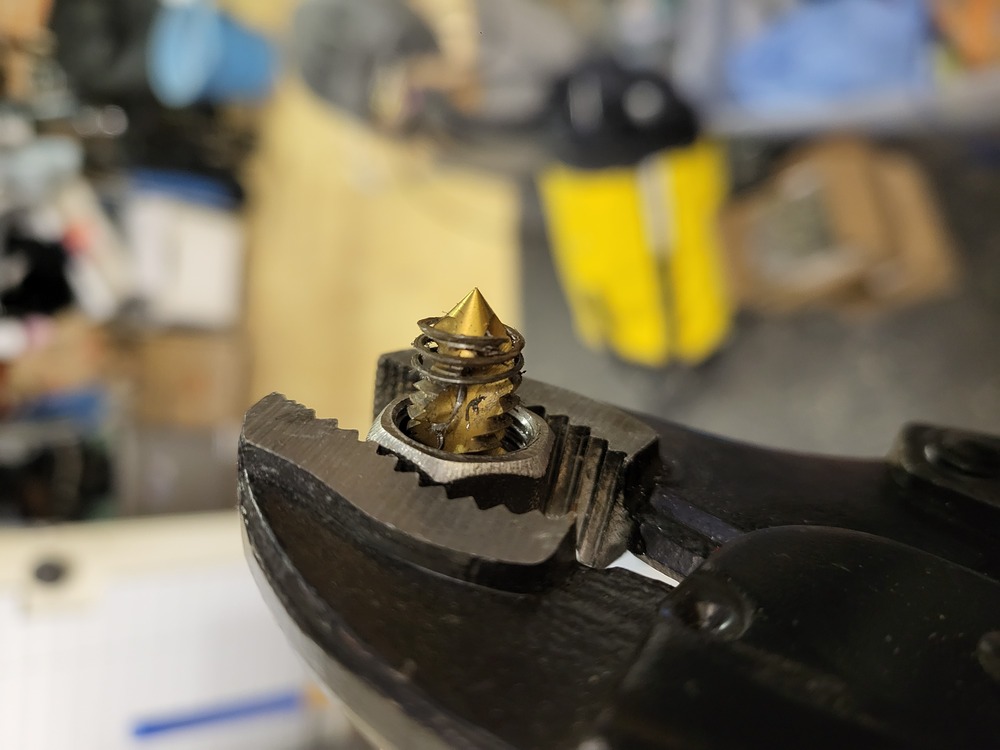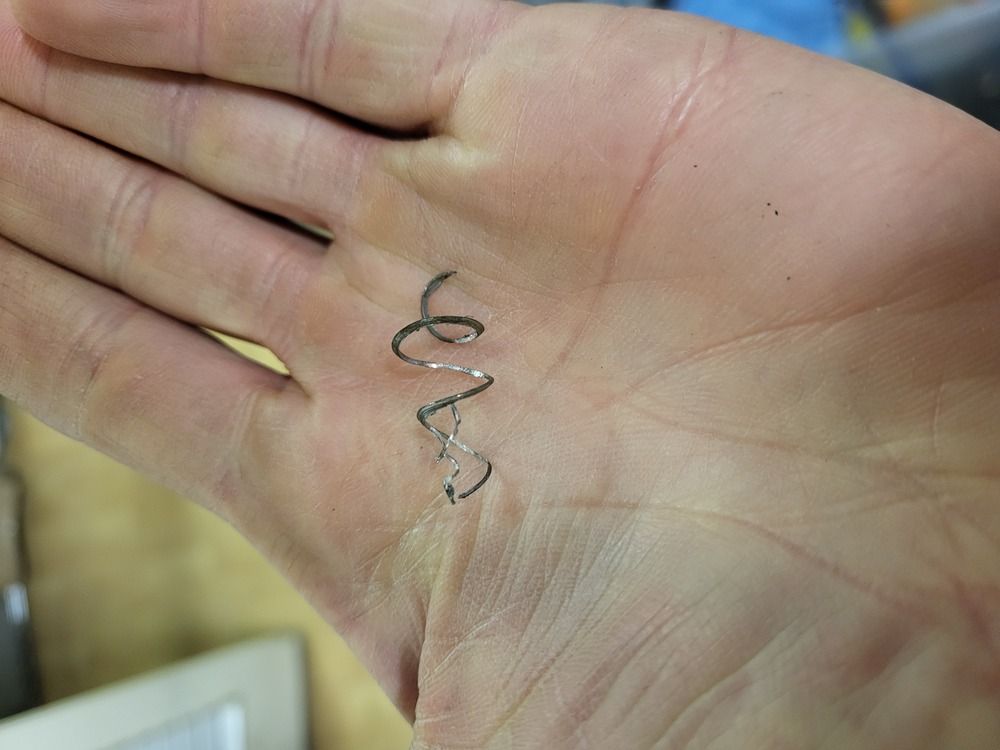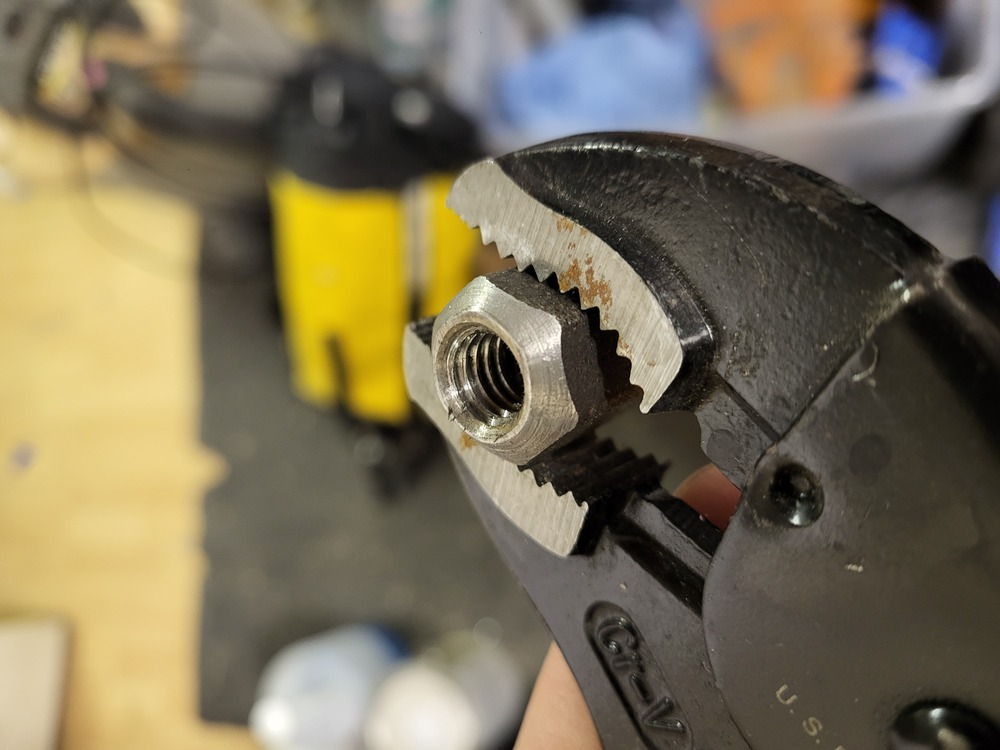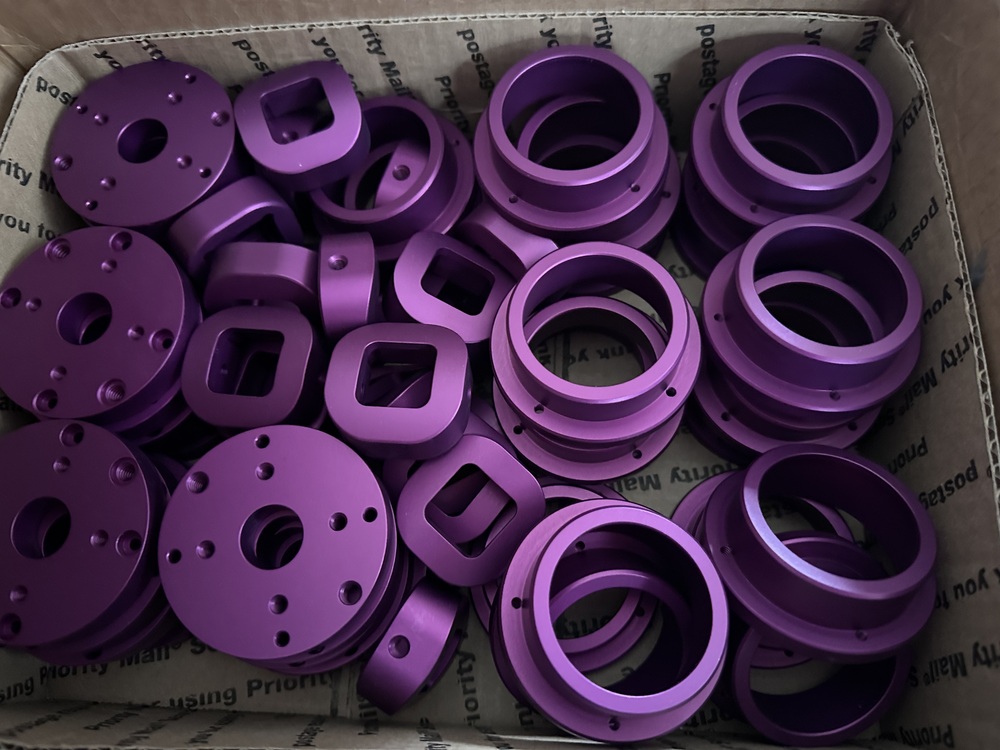Yet Another Bolt Remover
|
|
Thanks guys for you opinion, thankyou Casey and Peter. Nothing is created yet, It was just a proposal, so I am open to make any update on my prototype. Is a good point that is not possible to pull out the bolt as you spinning with a socket nut, I guess I will definitely keep the 1/2-20 thread. I am open for any interested close to Mexico to gains in the shipment cost. |
|
|
Last YABR of the current batch is available as part of a full rebolting tool kit (other than drill). This will likely sell for below retail value, and all money goes to supporting climbing stewardship at the BCC. Kit includes YABR, BD hammer, torque wrench, all the odds and ends, and a custom made tool bag. https://e.givesmart.com/events/yKJ/i/_All/olnF/?search= A second kit with lightly used YABR |
|
|
A new batch of YABRs are ready to go out. If you previously submitted the interest form, you should have received an email from me today. If not, please send me a message. If interested, and you have not previously filled out the form, you can do so here: https://docs.google.com/forms/d/1LxFcGAUKRLtY8Gfrj0Rl1SOsurWTgd40VAoccpndzNg/viewform?edit_requested=true |
|
|
There are still a few YABRs left in this batch. Also, for all the rebolters out there, want to share these bags that are hand made by a prolific rebolter in CO. They’re great for organizing all the tools needed for rebolting, and best kit I’ve used. |
|
|
we have another batch of YABRs ready, half have already shipped out, but we have 10 left. If you submitted the interest form, you should have received an email from me. If not, it’s likely in spam. If interested feel free to message me. For ease I’ve also listed them for purchase online, still at the same price. westernadventureinstruction… |
|
|
Hi folks. I have a different type of bolt removal hammer that is much cheaper. On good quality rock, the extraction efficiency is 80%. I have pulled out more than 1000 different old bolts with it, in the last 25 years Its big advantage is that it is very cheap and easy to produce. Its disadvantage is that it can be used on high-quality, crack-free rock. And the weight is not small either :) |
|
|
Oszkár Nádasdiwrote: Is this a slide hammer style remover? |
|
|
I have already removed many hundreds of bolts in hungaryan crags and few other places. You can't pull everything out with it! First of all, the galvanized industrial bolts that have started to rust (inside!). About 80% can be pulled for the 10mm bolts and nearly 100% of the 8mm bolts :) The Raumer "double expansion" (with two expanding collar) bolt cannot be pulled out. If the hole and the rock are not damaged, you can use these holes again. If the old bolts came out easily, after re-drilling and cleaning, these can be used with these Raumer double expansion, long kind bolts (we tested it several times with Hilti tester). In all other cases (rock, hole damage, bolt breakage) it is possible to glue a new bolt or 12mm bolt, or plug the hole (rock restoration) and drill a new one, of course. If the bolt doesn't come out, I usually break it, so that the rock doesn't break... My experience is that the bolt breaks sooner if the rock is good. If the rock breaks out, it's better not to put a bolt in there! Video: https://drive.google.com/file/d/1u2G-hMsYsHfzJd6jTtO6HF6T_ntfZYtb/view?usp=sharing |
|
|
Had a YABR for the better part of a year, totally love it. I have, however, gone through multiple of the coupler nuts at this point. They seem particularly venerable to any damage (slight cross-threading when fitting over a bolt stud, slightly deformed bolt studs from rust or hammering, excessive thrust forces when a bolt may not be totally ready to pull out). Not all of these are avoidable in all situations depending on the quality/age of the bolt in situ. Mostly pulling 3/8 wedges (some split shafts), all between 40-20 years old in hard gneiss. Have other people had similar issues? Am I to blame? I'm thinking of switching it out for one of these: 3/8 16 to 1/2 20 coupler nuts |
|
|
Hi Matt, My frustration with the commercial options lead me to start making couplers, initially with 1215 carbon steel which is fairly soft but easy to machine. Those were not durable enough, and I switched to hardened 4140, which is harder to machine, and hard on tools, but much more durable. Tooting my own horn, I think the 4140 couplers are the best available. They are shorter than commercial couplers, fully threaded, and harder/more resilient than anything else I’ve used. I don think you’re to blame, but there may be more you can do to preserve the useful life. I worked with Prescott Climbers Coalition replacing 200+ bolts in September and went through 2 couplers and one set of drawstuds to replace all those bolts. I try to be careful not to cross thread bolts, and always work to get 3 threads engaged on the bolt. I also regularly run a tap through to clean up any damaged threads and debris. When the bolt is damaged I’ll use a die to clean up those threads, or a chamfer tool if the head is mushroomed. All couplers are a consumable part, but I would expect to get at least 50 bolts (usually more) before they start to wear out. |
|
|
Peter Thomaswrote: Would slapping some graphite based anti galling lubricant on the threads be useful? |
|
|
When I make these, I use 4140 steel which I then harden and temper resulting in them being harder than the bolt threads and presumably lasting longer. |
|
|
I have a few suggestion for making coupler nut last longer(more importantly not fucking up your tools mid job). 1. Use seperate coupler nut for spinning from the coupler on your pulling tool. I use full length thread couplers on pulling tool. I use cut down length grade 8 couple nuts for spinning. I never jam the coupler nut against the SDS adapter when Spinning. Rather I make sure that the bolt being spun bottoms against the SDS adapter and not in the threads. Then once you loosen the SDS adapter in the Coupler, the coupler will come right off the bolt. Every time. 2. I always attach coupler nut to the bolt with my fingers. Since you are only removing a small number of bolts in a day you are not saving much time running the coupler nut on with the drill. 3. I have a 3/8 die, a de÷burring tool, and a hack saw blade in my kit. That way I never have to put a coupler nut on buggered threads. 4. I always have an extra spinning coupler in case i still fuck up. But up to now that has been limited to dropping something. |
|
|
It’s funny how experienced people doing the same things with similar tools come to totally different well thought-out conclusions. There are lots of right ways to do things. I’m 100% with you on #3/4. As mentioned up thread I also use a tap to clean up the couplers occasionally. #1 I’m a firm believer in using the same nut for everything, and once on, not taking it off until the bolt is out. I find every time I install/remove a nut on a crappy bolt I increase the likelihood of messing up the bolts threads. My process is: remove nut/hanger - install spinner (usually with drill) - drive the bolt back with drill hammer mode - spin - separate coupler from sds adapter and install puller, then pull. Occasionally I’ll cycle back to spinning if it’s hard to pull. I do agree on bottoming the bolt against the sds adapter. Much easier to break loose, the bolts won’t jam. #2 is probably good practice, but I often use the drill (carefully). From Matt’s question above, I think the threads sheared off the bolt inside the coupler rather than coupler threads shearing. You can see the ridges from the threads lined in green, and chunks of foreign metal inside the threads. Above the upper green line you can see the root of the first thread where the nut is counter sunk/chamfered. If that is the case, cleaning the treads out with a tap should solve the problem, and the coupler should still be functional. |
|
|
I've just had better luck with my coupling nuts, I guess. I rarely have one wear out or strip (the draw studs are another matter). I'm still using the Northwestern Tool stainless insert with a 1/16" hardened roll pin to lock it in place. |
|
|
Outstanding! What a great example of community input and collaborative efforts on this. Within a few hours Peter and I were emailing back and forth pictures and had some working solutions. After work today I was able to confirm that the coupler nut was not the problem here. It was the threads off the old (i.e. corroded and softer metal) that sheared off inside the relatively harder 4140 steel coupler. I ran my 3/8 16 tap through the coupler and was able to cleanly remove the entire thread of the old bolt in one pass - a clean corkscrew of offending material. The coupler is clean and ready for many more days pulling bolts. I will also be taking some of the advice above into my typical re-bolting kit. I'll probably carry the tap to clean any future gummed up couplers, and a die/de-burring tool to clean up the threads on a bolt if they look totally wack. I do already use a separate coupler nut for spinning and nearly always screw it on by hand. Looking forward to future re-bolting missions, keep up the work ya'll. Tap threaded through coupler nut, old metal on tip of tap 'corkscrew' of metal from old bolt that had sheared off and gummed up the coupler nut. clean threads, ready for the next use. |
|
|
Hi all, we’ve got another batch of YABRs ready to go out. If you’ve sent a message or filled out the interest form, you should have heard from me. We have several yet to be claimed. Prices are still the same, and the YABR/accessories are available here https://westernadventureinstruction.com/store-1 |

 Continue with onX Maps
Continue with onX Maps Sign in with Facebook
Sign in with Facebook



















